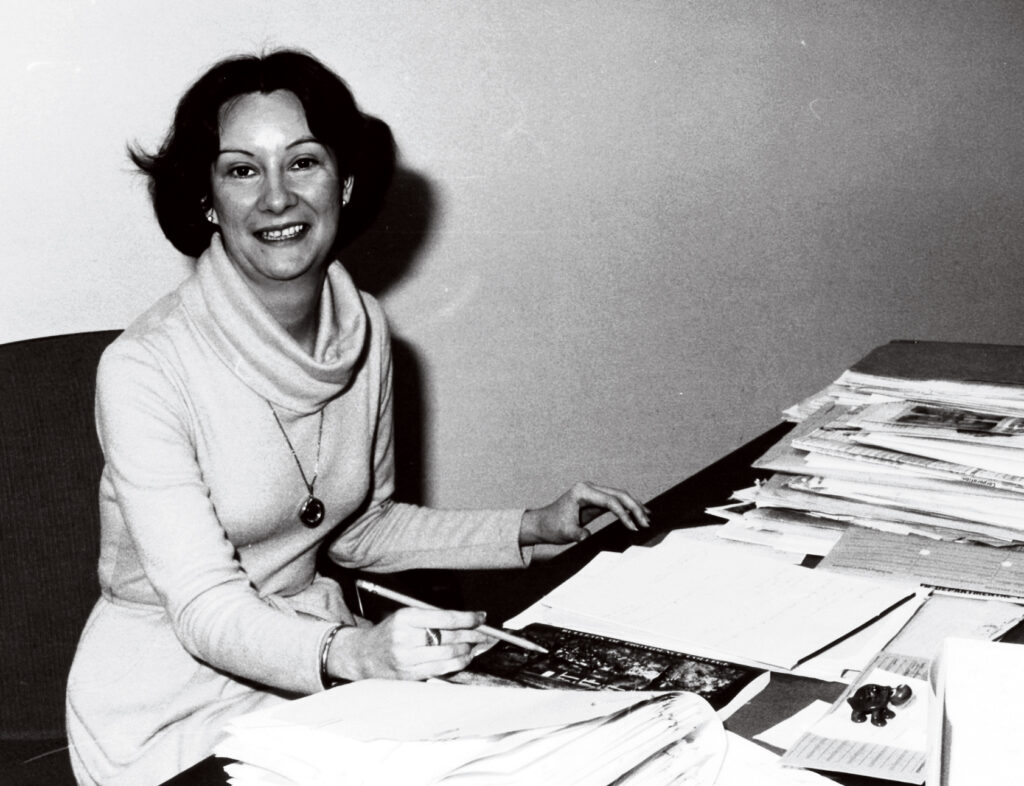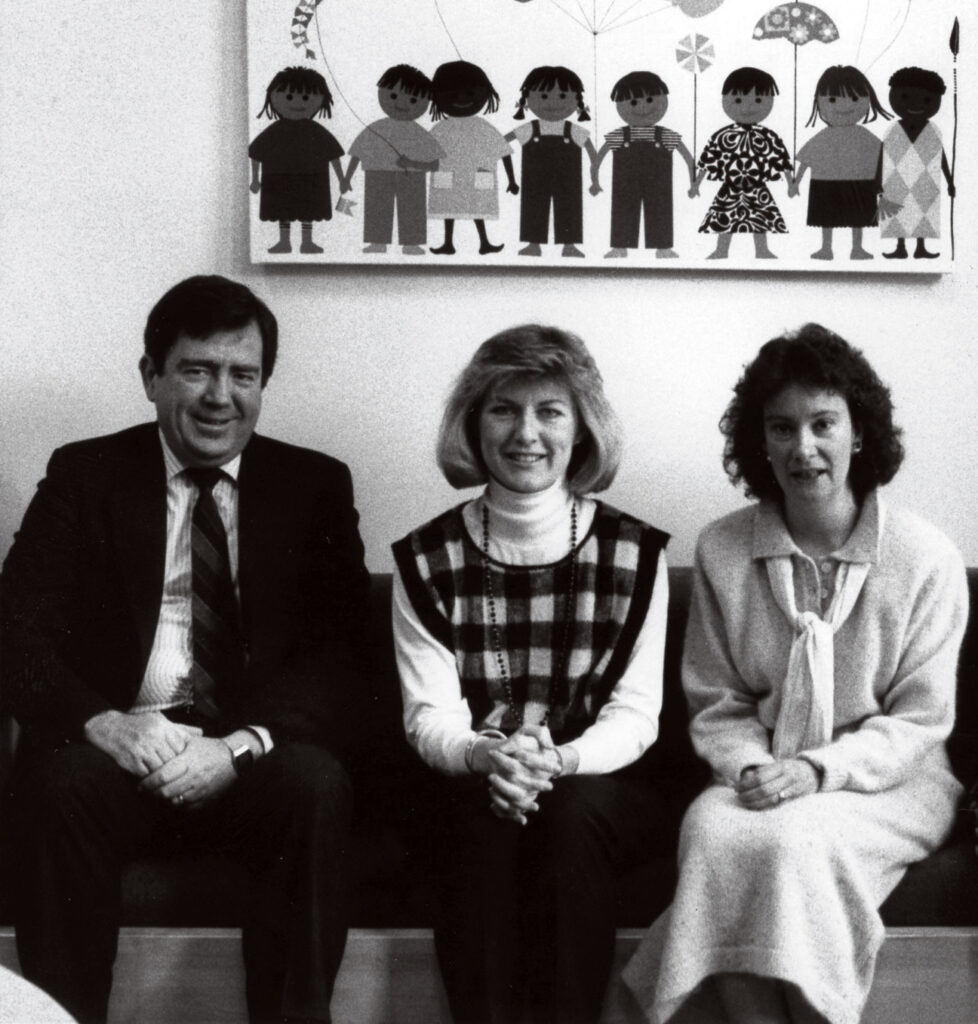Personal counseling from the beginning
By Vicki-Ann Downing ’21G
No one is prouder of the gains made by the Personal Counseling Center than Jacqueline Kiernan MacKay, now director of the college’s Parent and Family Program.
In September 1973, MacKay, newly graduated with a master’s degree in counseling psychology from Assumption University, joined PC’s fledgling Counseling and Career Placement Center. Within four years she was the director, and seven months after that, drew on the relationships she established to face the college’s greatest challenge — the Aquinas Hall fire that resulted in the deaths of 10 women.
PC began offering mental health counseling services in September 1966 at the request of Student Congress. An office in Harkins Hall was staffed by two psychologists who also taught in the psychology program when it launched the following year. But the office was not as successful as hoped. On November 9, 1967, half of The Cowl’s front page was devoted to a story by Joseph Brum ’68, ’18Hon. (later PC’s vice president for alumni and development) titled, “PC Counseling Center Not Meeting the Needs of Students.”
“Most of the faculty and administration look upon the Counseling Center as a psychological novelty of little practical use and seldom refer students to it,” Brum wrote. “Consequently the center has not been able to secure the complete respect and cooperation of the people it was created to serve.”
Anxiety about the future was foremost in the minds of students. The college needed a central location from which to provide not only counseling services, but resources for career direction, academic success, and course selection, The Cowl said. Such a center, modeled on one at The College of the Holy Cross, could help lower the dropout rate — 100 students had left PC without completing a degree the previous year, Brum reported.

The Counseling and Career Placement Center that MacKay joined as full-time counselor was a response to those concerns, though academic advising was handled by the Dean’s Office. The center also included a part-time counselor and a career placement director. College President Rev. Thomas R. Peterson, O.P. ’51, ’85Hon. gave MacKay free rein.
“There was no identity for the center whatsoever,” MacKay said. “I needed to create a sense of trust within the campus community so that faculty and staff would feel comfortable referring students there. I went to the faculty lounge in Harkins Hall every day just to build relationships. I reached out to Donna McCaffrey (’73G, ’83Ph.D., ’87G) in Residence Life and arranged to hold trainings with hall directors and resident assistants. I worked closely with the Chaplain’s Office and the Dean’s Office.”
To identify places to refer students for services beyond what was available on campus, MacKay connected with facilities such as the Providence Center on Hope Street. It was all about building a strong foundation.
The relationships MacKay established were tested in the early morning hours of December 13, 1977, when she was awakened by a telephone call and asked to come to campus. There had been a fire during the night. Students had died. The words were so terrible that she hoped it was a nightmare.
“In those days there was no internet,” MacKay said. “There was little in literature about survivor’s guilt or how to deal with grief and loss.”
MacKay worked with Rev. John J. Reid, O.P., the college chaplain, and health professionals in the community. She partnered with Sally Thibodeau, Ph.D. ’66G, ’22Hon., assistant dean of undergraduate studies. She visited students and their families in hospitals and attended wakes and funerals. Even as she looked out for others, students looked out for her. A small group, including James Drinan ’78, Susan Martin-Phipps ’79, and Jane Hickey Silvestri ’78, provided support and even cooked meals for her.
Before students returned to campus in January 1978, MacKay arranged for J. Eugene Knott, Ph.D., a professor at the University of Rhode Island who ran a support group on grief and loss, to speak to resident assistants.

Even in those years, students sought help for a range of mental health issues, including depression and anxiety, despite the great stigma attached to seeking help at that time.
“On the national level, it wasn’t until the mid-1980s that services for students were viewed as integral to the college experience,” MacKay said. “It was no longer just about learning in the classroom, but also learning about the self, relationships, and the impact on learning of everything that takes place outside the classroom.”
The Counseling and Career Placement Center was renamed the Student Development Center in 1985. In 1988, it split into three separate entities dedicated to personal counseling, career education, and student services. John T. Hogan, Ph.D., a staff counselor since 1981, became director of personal counseling. He retired in 2013. MacKay became assistant vice president for student affairs and coordinator of summer orientation, where she developed an award-winning program in undeclared student advising with Francis Patrick MacKay, Ph.D. ’20Hon., chemistry professor and vice president for academic administration. They married in 1983.
“I’m especially thrilled with the growth of the Personal Counseling Center,” MacKay said. “So many families are grateful that our counseling services are so comprehensive. We don’t put limits on the number of sessions. We have counselors with experience and expertise in serving a broad range of needs. The college has made a real commitment to students and their well-being. We have stayed true to our mission. I’ve loved seeing it come full circle.”
The Fund for Providence College is proud to support the work of the PC Personal Counseling Center. Your gift through The Fund for Providence College can have an immediate and profound impact on PC students.





